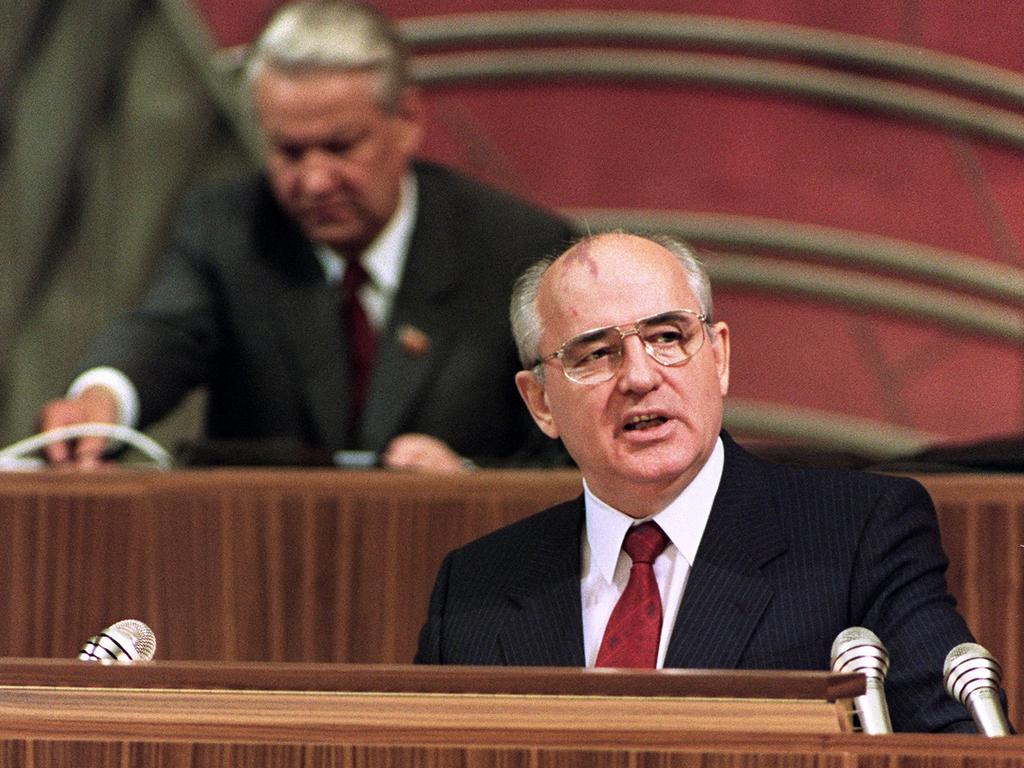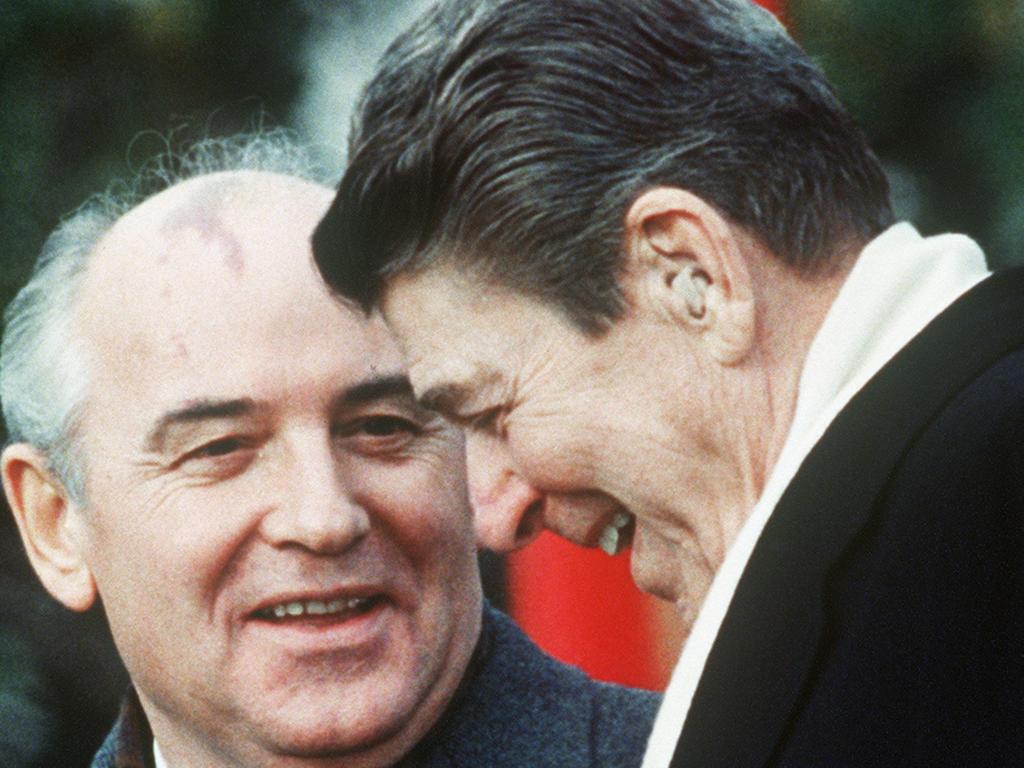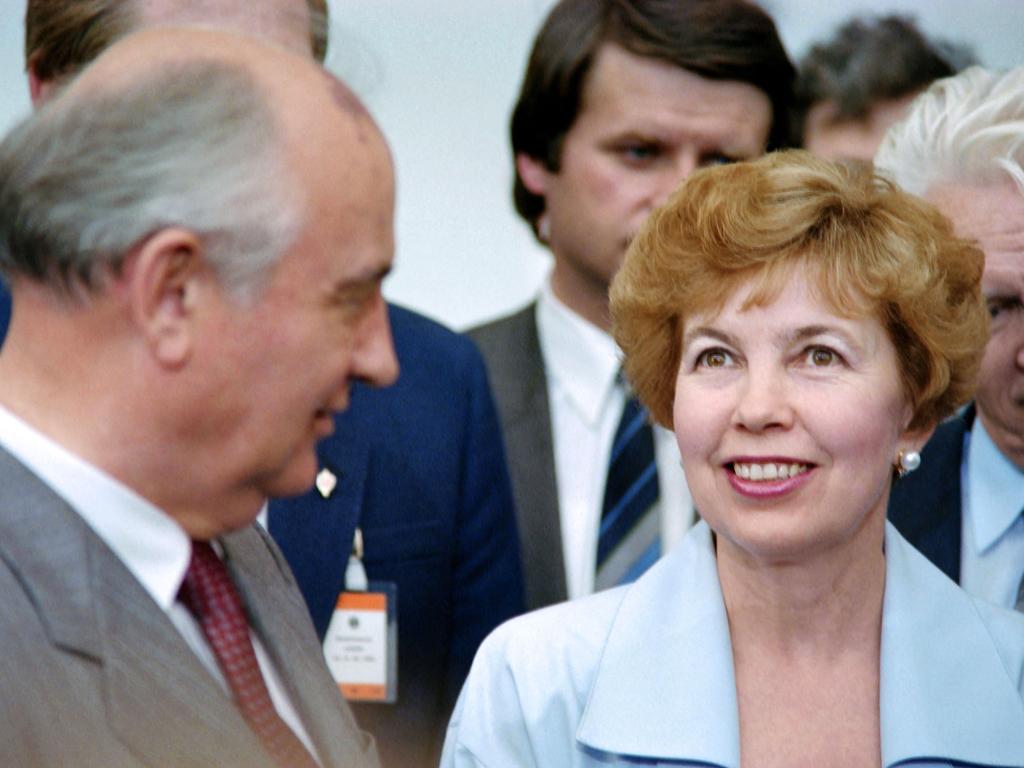Vladimir Putin and Mikhail Gorbachev weren’t such different men

That was met with some disbelief among the former Soviet allies but also whoops of joy. They could smell revolution in the air. No such jubilation came from Moscow’s securocrats who knew that the 1989 uprisings spelled an end to the Soviet Union itself. Among the sceptics was the KGB officer Vladimir Putin who saw the end of the Soviet Union as the “greatest geopolitical catastrophe of the century”.

There was then an uneasy tension between Gorbachev, living out his days as a critic of authoritarian rule, and Putin struggling to find a mission for a Greater Russia to replace the defunct Soviet Union. Here’s Gorbachev on Putin’s dogged rule: “People do not want to be a mass, a flock led for decades by the same shepherd.”
Putin offered what he said were his deepest condolences to the Gorbachev family and the last leader of the Soviet Union is set to be buried with honours in the Novodevichy cemetery alongside his wife, Raisa. But as Alexander Dugin – the Putin guru who narrowly escaped assassination the other day – puts it, the present inhabitant of the Kremlin has devoted his rule to “overthrowing the unjust world order” that came about when Gorbachev allowed the Soviet Union to crumble.

The Putin Doctrine has long since replaced Gorbachev’s laissez-faire policy towards Russia’s neighbours. If a country in the post-Soviet space shows signs of entering a formal security or economic partnership with the West it can now expect hostile action from Moscow, starting with disinformation campaigns and cyberattacks, moving on to border incidents, the weaponisation of Russian-speaking minorities, annexations and invasion.
The West portrays this brinkmanship as the work of an aggressive rule-breaker, but what has been playing out is rooted in traditional Moscow Rules. Russia has been an expanding power since the days of Dmitri Donskoi, the 14th century Tatar-slaughtering Prince of Moscow. Putin has, according to his apologists, to show the existence of a strong state by identifying and defeating his enemies at home and abroad. And only a strong state can successfully bring about the modernisation of the economy and society. Change in Russia, with a few exceptions, has always been imposed from above. Both Gorbachev and Putin operated within this known historical framework. From Peter the Great to Alexander II and Peter Stolypin, tsarist-era reform came from a powerful centre. Gorbachev, say his critics, by liberalising the freedom of expression (glasnost) and accepting public criticism weakened his ability to overhaul Russia (perestroika).

These arguments, though flawed, have been part of both Gorbachev and Putin’s understanding of government. As a result the two have often seemed to duplicate policy. Despite the praise presently being heaped on Gorbachev, it was under his rule that Soviet forces killed 22 protesters in Tbilisi in April 1989, and that 150 were killed in Azerbaijan’s 1990 Black January massacre. Soldiers fired on demonstrators in Lithuania and Latvia. Gorbachev was trying to fend off a hardline challenge, say his supporters, citing the attempt to oust him in a coup in August 1991. But many in the Baltic states especially bear him a grudge to this day.
Putin borrows from Gorbachev. Many of the adjustments made by Gorbachev to Soviet policy – a close relationship with Israel, a more open policy towards the Gulf states, the healing of a rift with Iran – laid the foundation of Putin’s declared Middle East policy of avoiding enmities and alliances in the region.
And Gorbachev and Putin were at one on the 2014 annexation of Crimea. Gorbachev had removed Ukrainian elites from the centre of power in the Soviet Union, correcting, as he saw it, their excessive influence under Nikita Khrushchev and Leonid Brezhnev. He had also urged the US to use its influence on Kyiv to pull Ukraine back from its “suicidal nationalism”.
So when Putin snatched Crimea, he understood it as a protective move. The risk from Ukraine, it seemed to him, was that a fickle government would try to play off the West against Russia. He opposed the western sanctions that followed Putin’s land grab. He seemed to suggest that the West was trying to instigate a new Cold War. “I am absolutely certain that Putin protects Russia’s interests better than anyone else,” he declared. That certainty weakened over time. When Putin launched his full-out war, the Gorbachev Foundation merely urged a speedy peaceful settlement.
Russia today is not the one that Gorbachev would have hoped for: he opposed the locking up and persecution of Alexei Navalny not just because he valued the role of public accountability but also because he had come to recognise that creating a police state was a waste of energy. The lasting difference between Gorbachev and Putin was the former’s conviction that maintaining a strong leadership was not the same as building up police powers and diverting scarce resources into creating a huge invasion force. Gorbachev understood Putin and the narrow segment of the security elite that had fostered him. But he understood too that Putin’s obsession with making Russia feel safe from its largely imaginary enemies was blighting Russia’s future.
The Times







It was Mikhail Gorbachev’s ruling team that came up with the term the “Sinatra doctrine”, signalling to the countries of eastern Europe that they were free to choose their own democratic way without the Kremlin’s interference, even if that meant the defeat of ruling communist parties. The Soviet Union, in other words, was ready to free itself from the burden of colonial control to concentrate on its own internal reforms.